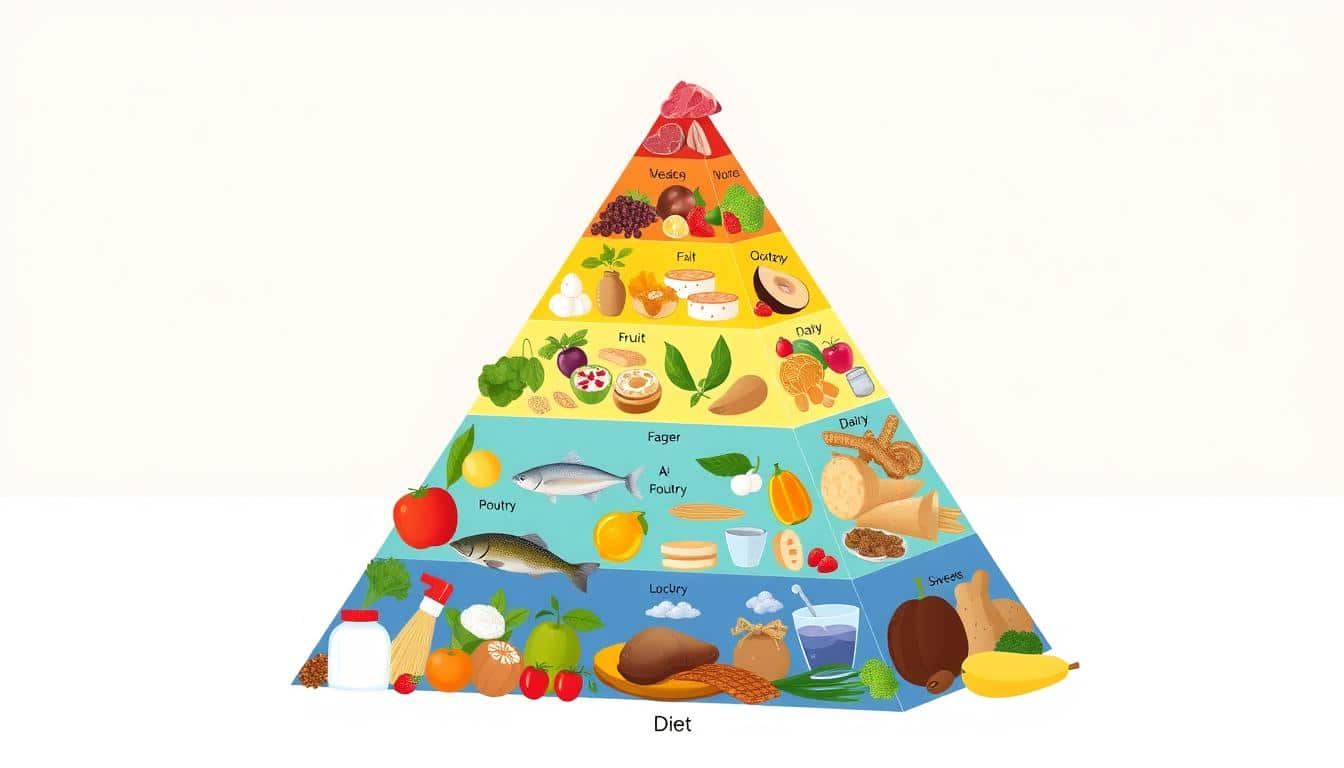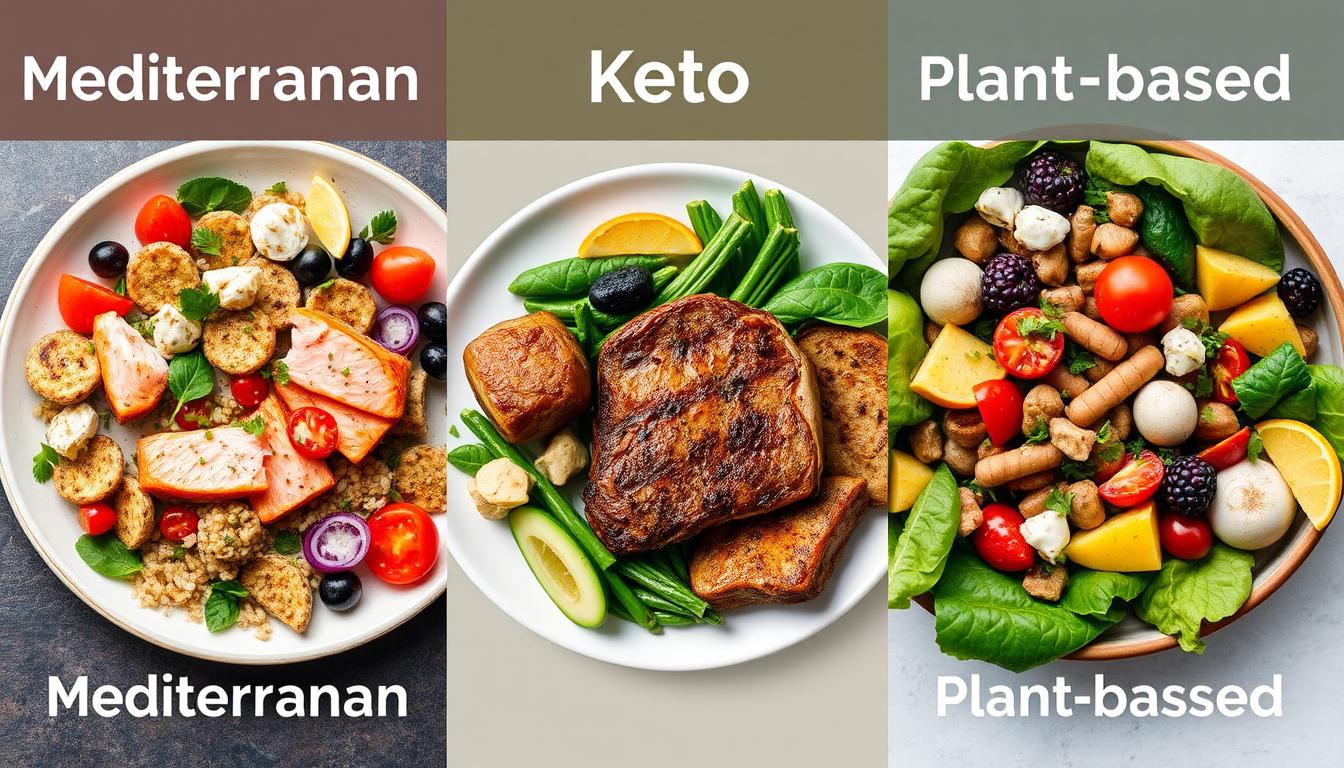Why the Mediterranean Diet Tops the Charts Year After Year
According to Best Diets 2025, the Mediterranean diet earned an impressive overall score of 4.8 out of 5, outranking 39 other popular diets. What makes this eating pattern so special? Let’s look at the key factors behind its consistent #1 ranking:
Scientifically Proven Health Benefits
The Mediterranean diet isn’t just popular – it’s backed by decades of rigorous research. Studies consistently show it reduces the risk of heart disease by up to 30%, lowers the chance of stroke by 20%, and decreases the risk of type 2 diabetes by 33%. These aren’t small improvements – they’re life-changing benefits supported by some of the most comprehensive nutrition research ever conducted.
Exceptional Sustainability
Unlike restrictive diets that are difficult to maintain long-term, the Mediterranean diet scored a perfect 5/5 for sustainability in the Best Diets 2025 rankings. This is largely because it doesn’t eliminate entire food groups or require complicated calorie counting. Instead, it focuses on enjoyable, whole foods that leave you satisfied while nourishing your body.
Balanced Nutritional Profile
The diet earned a 4.9/5 for nutritional completeness in the 2025 rankings. It naturally provides a wide spectrum of essential nutrients through its emphasis on diverse plant foods, healthy fats, and moderate amounts of quality protein sources. This balanced approach helps prevent the nutritional deficiencies often associated with more restrictive eating plans.
“The Mediterranean diet continues to stand out because it’s not actually a ‘diet’ in the traditional sense – it’s a sustainable eating pattern that people can follow for life without feeling deprived. The scientific evidence supporting its health benefits is simply overwhelming.”
Core Components of the Mediterranean Diet

Foods to Embrace Daily
Plant-Based Foundation
- Vegetables: Tomatoes, spinach, broccoli, kale, peppers, eggplant, zucchini
- Fruits: Apples, oranges, berries, grapes, dates, figs
- Whole grains: Brown rice, whole wheat bread, oats, barley, farro
- Legumes: Chickpeas, lentils, beans
- Nuts and seeds: Walnuts, almonds, sunflower seeds
Healthy Fats
- Extra virgin olive oil (primary fat source)
- Olives
- Avocados
Herbs and Spices
- Garlic, basil, oregano, rosemary, mint
- Pepper, cinnamon, cumin
Foods to Enjoy in Moderation
Protein Sources
- Fish and seafood (at least twice weekly)
- Poultry, eggs (a few times weekly)
- Greek yogurt and cheese (small amounts daily)
Beverages
- Water (primary beverage)
- Coffee and tea (unsweetened)
- Red wine (optional, 1 glass with meals)
Foods to Limit
- Red meat (no more than once weekly)
- Processed foods and meats
- Added sugars and refined grains
- Butter and margarine
Sample Mediterranean Diet Meal Structure

| Meal | Sample Components | Key Principles |
| Breakfast | Greek yogurt with honey, nuts, and fresh fruit; OR whole grain toast with avocado and eggs | Include protein, healthy fat, and fiber |
| Lunch | Large salad with vegetables, chickpeas, feta, olive oil dressing; OR whole grain wrap with hummus and vegetables | Emphasize vegetables, include plant or lean protein |
| Dinner | Grilled fish with roasted vegetables and small portion of whole grains; OR vegetable and bean soup with whole grain bread | Protein (often fish), abundant vegetables, modest grain portion |
| Snacks | Handful of nuts, fresh fruit, small piece of cheese, or vegetable sticks with hummus | Whole, unprocessed foods that provide satiety |
New Research Supporting the Mediterranean Diet (2024-2025)

Cognitive Health Breakthrough
A landmark 2024 study published in the Journal of Neuroscience found that adherence to the Mediterranean diet was associated with a 23% reduction in cognitive decline risk among adults over 65. Researchers identified that the combination of omega-3 fatty acids from fish and antioxidants from colorful vegetables created a neuroprotective effect that other diets failed to match.
Microbiome Benefits Confirmed
New research from 2025 has revealed that the Mediterranean diet significantly improves gut microbiome diversity within just 4-6 weeks of adoption. This improved microbiome profile was linked to reduced inflammation markers, better immune function, and improved mood regulation—suggesting the diet’s benefits extend beyond physical health to mental wellbeing.
Longevity Genes Activated
Perhaps most exciting, a 2025 study published in Cell Metabolism demonstrated that the Mediterranean diet activates specific “longevity genes” that help repair cellular damage. The combination of olive oil polyphenols and plant compounds appears to trigger autophagy—the body’s cellular cleaning process—more effectively than any other dietary pattern studied.
Key Statistic: According to the Best Diets 2025 report, the Mediterranean diet received a perfect 5/5 score for its scientific evidence base—the only diet to achieve this distinction for eight consecutive years.
Practical Tips for Adopting the Mediterranean Diet

Incorporating the Mediterranean diet into your modern lifestyle doesn’t have to be complicated. Here are practical strategies to make this healthy eating pattern work for you:
Start with Simple Swaps
Instead of:
- Butter or margarine
- Refined white bread
- Sugary breakfast cereals
- Red meat as a daily protein
- Creamy salad dressings
Choose:
- Extra virgin olive oil
- Whole grain bread
- Oatmeal with fruit and nuts
- Fish, poultry, or legumes
- Olive oil and vinegar dressing
Meal Prep Mediterranean Style
Even with a busy schedule, you can enjoy Mediterranean meals with some strategic preparation:
- Batch cook whole grains like brown rice, farro, or quinoa
- Prepare hummus and cut vegetables for quick snacks
- Make large Mediterranean salads that keep well for 2-3 days
- Keep canned beans, canned fish, and frozen vegetables on hand for quick meals
- Pre-portion nuts and seeds for grab-and-go snacks
Mediterranean Diet on a Budget

Contrary to popular belief, eating Mediterranean doesn’t have to break the bank:
- Buy seasonal produce when it’s most affordable
- Use canned fish like sardines and tuna as economical alternatives to fresh fish
- Purchase beans and grains in bulk
- Grow herbs on your windowsill for fresh flavor without the cost
- Shop at farmers’ markets near closing time for potential discounts
Need more practical guidance?
Our Mediterranean Diet Quick-Start Guide includes time-saving tips, budget-friendly shopping strategies, and simple recipes perfect for beginners.
How the Mediterranean Diet Compares to Trending Diets

With so many diet trends competing for attention, it’s worth understanding how the Mediterranean diet stacks up against other popular approaches. Here’s how it compares to two of today’s most talked-about diets:
Mediterranean Diet
- Emphasizes whole, minimally processed foods
- Includes all food groups in balanced proportions
- Primary fat source: Extra virgin olive oil
- Moderate protein from diverse sources
- Includes whole grains and legumes
- Flexible and adaptable to preferences
- Decades of research supporting benefits
Ketogenic Diet
- Severely restricts carbohydrates
- Eliminates many fruits and whole grains
- Very high fat intake (70-80% of calories)
- Heavy emphasis on animal proteins
- Can be difficult to maintain long-term
- May cause “keto flu” during adaptation
- Limited long-term research on safety
Plant-Based Diet
- Focuses exclusively on plant foods
- Eliminates or minimizes animal products
- Various fat sources (nuts, seeds, oils)
- Requires attention to certain nutrients
- High in fiber and phytonutrients
- Growing research supporting benefits
- May require more planning for balance
Why Experts Prefer the Mediterranean Approach
In the Best Diets 2025 rankings, the Mediterranean diet outscored both keto (3.1/5) and strict plant-based diets (3.9/5) in overall effectiveness. Nutrition experts cited its balance, flexibility, and strong scientific backing as key advantages. While each approach has merits for specific health goals, the Mediterranean diet provides the best combination of nutritional completeness, sustainability, and proven health outcomes for most people.
“What makes the Mediterranean diet superior is its flexibility and focus on food quality rather than strict macronutrient ratios or eliminating entire food groups. It’s the rare example of a diet that’s both evidence-based and enjoyable enough for people to maintain for life.”
Expert Insights: What Nutritionists Say About the Mediterranean Diet

We consulted leading nutrition experts to get their perspectives on why the Mediterranean diet continues to dominate the rankings year after year. Here’s what they had to say:
“What sets the Mediterranean diet apart is its emphasis on food quality rather than quantity. By focusing on nutrient-dense whole foods, it naturally regulates appetite and promotes metabolic health without requiring calorie counting or portion control.”
“The most impressive aspect of the Mediterranean diet is its anti-inflammatory profile. The combination of omega-3 fatty acids, antioxidants, and polyphenols creates a powerful synergy that addresses the root cause of many chronic diseases. No other dietary pattern achieves this as effectively.”
“I recommend the Mediterranean diet to most of my patients because it’s the rare example of an eating pattern that’s both evidence-based and culturally rich. The focus on enjoying meals with others and savoring food mindfully addresses the psychological aspects of eating that many diets ignore.”
Beyond Nutrition: The Lifestyle Component
Experts emphasize that the Mediterranean diet isn’t just about food choices—it’s about adopting a holistic approach to eating and living:
- Enjoying meals with family and friends
- Taking time to savor food mindfully
- Staying physically active through daily movement
- Prioritizing adequate rest and stress management

Getting Started: Your 7-Day Mediterranean Diet Plan
Ready to experience the benefits of the Mediterranean diet for yourself? Here’s a simple framework to get you started with a 7-day plan that incorporates the core principles while keeping preparation simple and enjoyable.
Day 1: Simple Beginnings
- Breakfast: Greek yogurt topped with honey, walnuts, and fresh berries
- Lunch: Whole grain pita with hummus, cucumber, tomato, and olives
- Dinner: Baked salmon with roasted vegetables and small portion of brown rice
- Snack: Handful of almonds and an orange
Day 2: Vegetarian Focus
- Breakfast: Whole grain toast with avocado and a sprinkle of za’atar spice
- Lunch: Mediterranean lentil soup with side salad dressed in olive oil and lemon
- Dinner: Vegetable and chickpea stew served over small portion of whole grain pasta
- Snack: Apple slices with small piece of natural cheese
Day 3: Seafood Spotlight
- Breakfast: Overnight oats with cinnamon, dates, and pistachios
- Lunch: Greek salad with tomatoes, cucumber, feta, olives, and olive oil dressing
- Dinner: Grilled shrimp with herb-roasted potatoes and steamed broccoli
- Snack: Bell pepper strips with tzatziki dip
The remaining days follow similar patterns, emphasizing variety while maintaining the core Mediterranean principles. The complete 7-day plan includes shopping lists, preparation tips, and simple recipes to make implementation as easy as possible.
Pro Tip: Don’t feel pressured to follow the plan perfectly. The Mediterranean diet is about progress, not perfection. Even implementing a few principles can lead to health improvements.
Frequently Asked Questions About the Mediterranean Diet

Can I lose weight on the Mediterranean diet?
Yes, many people successfully lose weight on the Mediterranean diet. While it’s not designed specifically for weight loss, its focus on whole, nutrient-dense foods naturally helps control calorie intake without counting. The high fiber content from vegetables, fruits, and whole grains promotes satiety, while the healthy fats help you feel satisfied. In the Best Diets 2025 rankings, it scored 4.7/5 for weight loss effectiveness.
Is the Mediterranean diet expensive to follow?
It doesn’t have to be. While some components like fresh fish and extra virgin olive oil can be pricier, many Mediterranean staples are quite economical—beans, lentils, seasonal vegetables, and whole grains are all budget-friendly. You can also use canned fish as an affordable alternative to fresh, and frozen vegetables retain most nutrients at a lower cost. Planning meals around sales and seasonal produce helps keep costs down.
How much red wine is recommended on the Mediterranean diet?
The Mediterranean diet includes moderate red wine consumption, typically defined as up to one 5-ounce glass daily for women and up to two for men, always with meals. However, this is entirely optional – if you don’t already drink alcohol, health experts don’t recommend starting just for potential benefits. Water remains the primary beverage on this diet.
Can the Mediterranean diet be adapted for vegetarians or vegans?
Absolutely! The Mediterranean diet is already plant-forward, making it easily adaptable for vegetarians and vegans. Simply emphasize the abundant plant proteins like legumes, nuts, and seeds, and if vegetarian, include eggs and dairy in moderation. For vegans, ensure adequate vitamin B12 intake through fortified foods or supplements. The flexibility of the Mediterranean diet is one reason it scored 4.9/5 for adaptability in the Best Diets 2025 rankings.
How long before I see health benefits from the Mediterranean diet?
Some benefits, like improved digestion and energy levels, may be noticeable within days or weeks. Measurable improvements in biomarkers like cholesterol, blood pressure, and inflammation typically appear within 3-6 months of consistent adherence. Recent research shows that positive changes to gut microbiome composition can occur in as little as 4-6 weeks on the Mediterranean diet.
Start Your Mediterranean Journey Today

The Mediterranean diet’s continued reign as the #1 best diet for eight consecutive years is no coincidence. Its unique combination of delicious flavors, nutritional completeness, and impressive health benefits makes it both effective and sustainable. Unlike trendy diets that often fade as quickly as they appear, the Mediterranean approach has stood the test of time—both in traditional Mediterranean cultures and in modern scientific research.
What makes this eating pattern truly special is its holistic approach to food and life. It’s not just about what you eat, but how you eat—slowly, mindfully, and often in the company of others. This combination of nutritional wisdom and lifestyle philosophy creates a powerful formula for long-term health and wellbeing.
Whether your goal is heart health, weight management, reduced inflammation, or simply enjoying delicious food that’s good for you, the Mediterranean diet offers a flexible, evidence-based path forward. And with the practical tips and meal ideas we’ve shared, you can begin incorporating these principles into your life today—no matter how busy your schedule or limited your cooking experience.
Ready to transform your health with the Mediterranean diet?
Download our comprehensive 7-day Mediterranean diet meal plan complete with shopping lists, recipes, and day-by-day guidance. Start enjoying the #1 diet’s benefits today!


